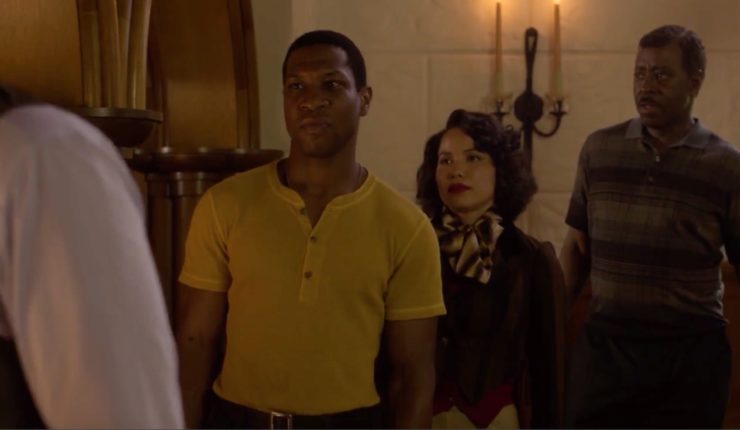Lovecraft Country continues with episode 2, wherein people are rescued, people die, and a dead woman gets some long overdue retribution.
The last time we saw George, Leti, and Tic, they were covered in blood after a night spent fighting shoggoths and racist cops. So it’s a bit of a shock when the second episode opens with George and Leti dancing around in their massive guest rooms and acting like everything is peachy keen, jelly bean. Leti is gifted with a wardrobe perfectly tailored to her size and tastes while George gets a vast library of all his favorite books. Only Atticus feels the weight of the previous night. Something took their memories, but before they can untangle that mess, William does his “appearing out of nowhere” act. He plays tour guide and coincidentally gives them just enough history to help them later when they make their escape plans.
To kill some time—and discreetly search for Montrose—they set out to explore the feudal village surrounding Titus Braithwaite’s castle. On the way they stumble upon the Woody looking exactly as it did before Leti crashed it into the cabin in the woods. And once again, William seems to appear out of thin air. He claims to be “a close personal friend” of Christina’s, but there’s something seriously off about him.
The villagers are old school, like way old school. Long, gray, plain clothes, women with their hair covered, and horses and carts. Adults finish up their daily tasks while children dance around a wicker woman, binding her in red ribbons. It’s like stepping back into the 18th century. Only Dell stands out. With her clamdiggers and tousled hair, she’s as modern as the current landowners. Digging through her racist insults, Tic, Leti, and George figure out she’s likely keeping Montrose locked up in the stone tower/meat locker. As they head back to the house to plan the breakout, George connects the dots between Atticus’s ancestor Hannah and the Braithwaites’s plans for Atticus. A frightening second encounter with the shoggoths in the woods ends with no blood or death this time. Instead, the trio learn Christina has control of the beasts, not to mention Leti and George’s memories.
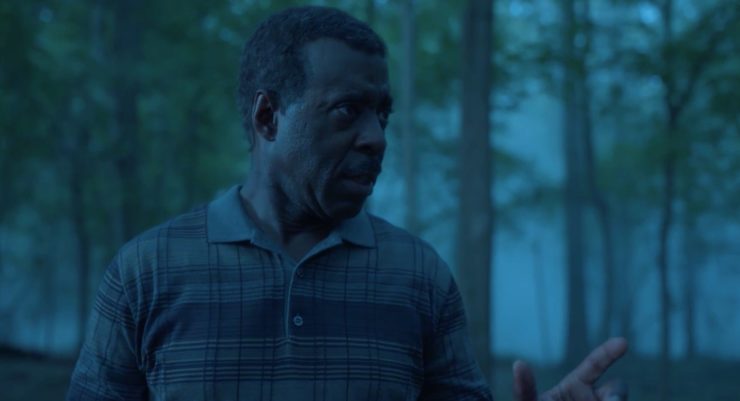
Finally Atticus meets Christina’s father, Samuel Braithwaite. Samuel isn’t mad or raving, but calm in his cruelty and dismissive of both his daughter and his cousin. Back in his room, Tic and Christina have a heart-to-heart. Although she agrees to undo the spell blocking Leti and George’s memories, she keeps the trio magically locked in their rooms.
George uses his imprisonment wisely by discovering the secret library hidden behind the bookcase. Shelves upon shelves of books, but the one left out on the table grabs his eye: “The Bylaws and Precepts of the Order of the Ancient Dawn.” Lucky coincidence? Or did Christina and William set him up? Either way, there’s a lot of learning going on in this episode. Some discoveries flow easily into the plot while others drag down the momentum. And every fact, important or otherwise, will be crucial to solving future mysteries, so I hope you’re paying close attention.
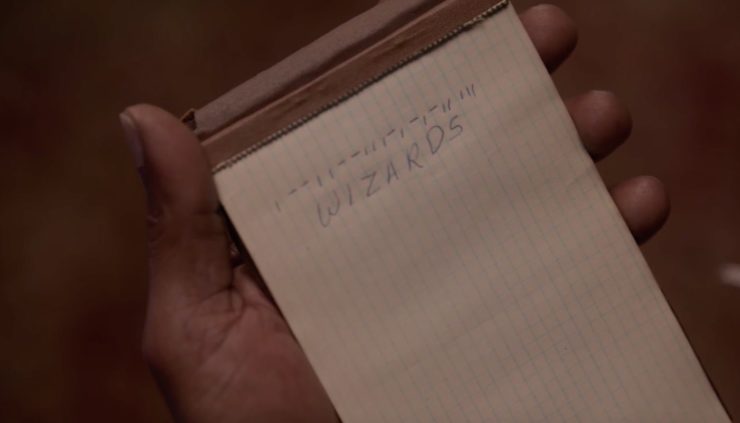
As the evening wears on, Leti, George, and Tic suffer spell-induced hallucinations, but that it’s all part of the pre-dinner entertainment for the white lodge members. Our heroes become the 1950s version of a human zoo where colonized people were kept in cages to be gawked at by white people. In many cases, people from Africa were displayed alongside apes and chimps. King Leopold of Belgium was notorious for his zoo where he kept 267 Congolese people trapped on his estate. Leti gives into her budding crush on Tic while Tic is thrust back into the Korean War as he fights Ji-ah, a woman soldier and presumably the woman from the phone call in the previous episode. George reunites with Dora, Atticus’s mother and the woman he loved before Hippolyta; later, in a conversation between Montrose and George, we learn that George is very likely Tic’s biological father, making this dream even more haunting.
Eventually William comes to collect them. George and Tic are summoned to dinner while Leti is shunned to dine on the veranda—no girls allowed in the wizard club. Time is running out. Either they flee Ardham now or never. Except the same spell that before trapped them in their rooms now bars their escape. At least Dell gets her brains bashed in by Leti for good measure. As punishment, Samuel shoots Leti and George, and forces them all back to the mansion to prepare for the spell.
Given Samuel and the Order’s disregard for women and Black people, it’s no wonder he shoots Leticia first. She isn’t just Black, isn’t just a woman, but is very specifically a Black woman. Misogynoir drives him to choose her first, and the act is a brutal violation he dismisses as a moot point. He doesn’t even consider her worth choosing from. She’s a thing to him, something to use against Tic. At least with Montrose and George he gave Atticus the choice, but Leti doesn’t even merit that to Samuel.

Christina isn’t the wallflower she’s been pretending to be. As much as she hates that Tic has the power she wants, she clearly has plans of her own that she needs him to execute. The signet ring she gifts him confers the Order’s power and becomes the key to Atticus’s survival. While Samuel’s spell succeeds in opening a gate to Creation, Hannah reaches through to her descendant and lashes out at her abusers. Her vengeance destroys the house and several of the lodge members in one fell swoop. That’s twice she’s ruined a Braithwaite’s life and property. Bad-ass.
I’m trying not to spend too much time comparing and contrasting Matt Ruff’s original novel and Misha Green’s new series, but we have to talk about genderswapping Caleb Braithwaite into Christina. It adds some really interesting complications to the story and opens the plot up the discussion of sexism, which we saw a hint of when Christina gave Atticus the signet ring. With Caleb, there was a clear social hierarchy, but with Christina things get blurrier. She’s both above Black people, which gives her plenty of privilege, and below white men, which allows her just enough room to play the victim. Certainly, she experiences oppression, but it’s not the same flavor or to the same degree as what Atticus—or Leticia—experience. Says Samuel Braithwaite, “From God to man to woman down to the lowliest wriggling creature. It was nirvana.” Christina Braithwaite may never be accepted as a lodgemaster, but she has wealth, magic, beauty, power, and whiteness that will open most doors that will always remain slammed shut for Tic and Leti.
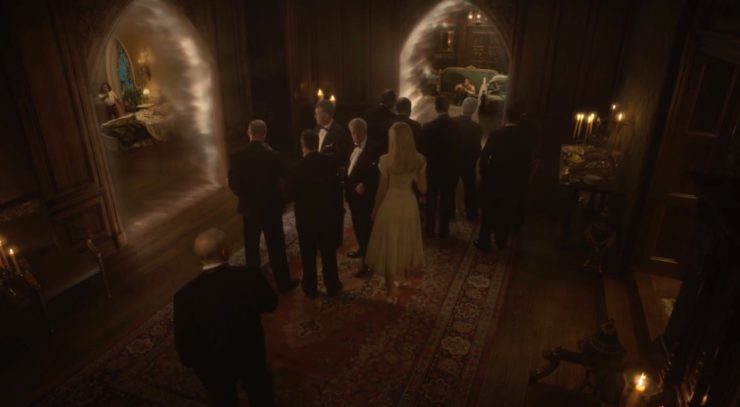
As we saw in the last episode, one of Montrose’s favorite books is The Count of Monte Cristo. It’s a piece of classic literature written by a prominent Black man about a man who is wrongfully accused and imprisoned who then escapes and amasses a fortune only to turn around and use it to punish his oppressors. For a man whose foundational life experience was the 1921 Tulsa Massacre, it makes sense why Montrose cherishes that book. He can live vicariously through not just Edmond Dantès but Dumas as well. Through it he gets to hold the power of creation and the power of destruction in his hands. Greenwood was creation and the retaliatory violence led by white Tulsans was destruction. Hannah’s enslavement and rape was destruction; her pregnancy and escape was creation. Atticus’s blood from Titus Braithwaite opens the gates to Creation, but his blood from Hannah slams them shut in an act of total destruction.
I should also point out that it looks like Misha Green is toying with the old trope of light versus dark magic. Samuel’s creation magic is golden light bursting with life and fertility, while Hannah’s (and therefore Tic’s) magic is black and dark, full of death and destruction. But black magic here isn’t inherently a bad thing nor white magic inherently good just because some white supremacist centuries ago decided on some racist rules.
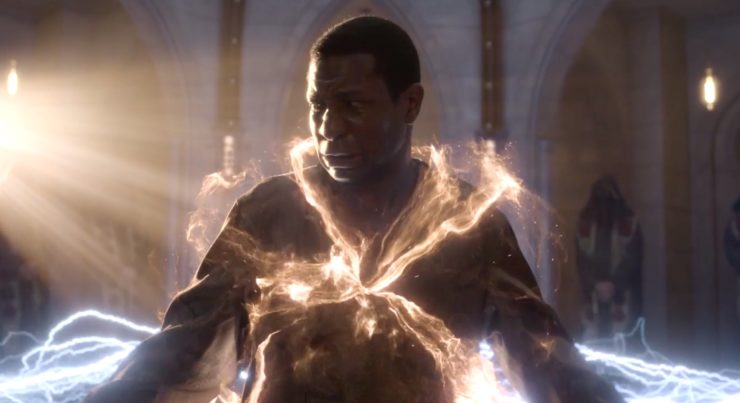
Even though the Braithwaite lodge is destroyed and our heroes escape the clutches of a sociopath, the episode ends on a tragic note. Whether or not George was really Atticus’s father, he was the father Atticus always wanted. Losing him to an act of white supremacist violence, especially after what he survived in Tulsa and Anna, is an insult too great and a grief to overwhelming.
Cultural texts referenced:
- Algernon Blackwood, a prolific writer of ghost stories who was mostly active in the 1910s and 1920s
- Clark Ashton Smith, an American poet and pulp writer contemporaneous to Lovecraft
- Sea-Wolf by Jack London (published 1904)
- Animal Farm by George Orwell (published 1945)
- The House on the Borderlands and Other Novels by William Hope Hodgson (published 1946)
- Wuthering Heights by Emily Brontë (published 1847)
- Jane Eyre by Charlotte Brontë (published 1847)
- The Wave: An Egyptian Aftermath by Algernon Blackwood (published 1916)
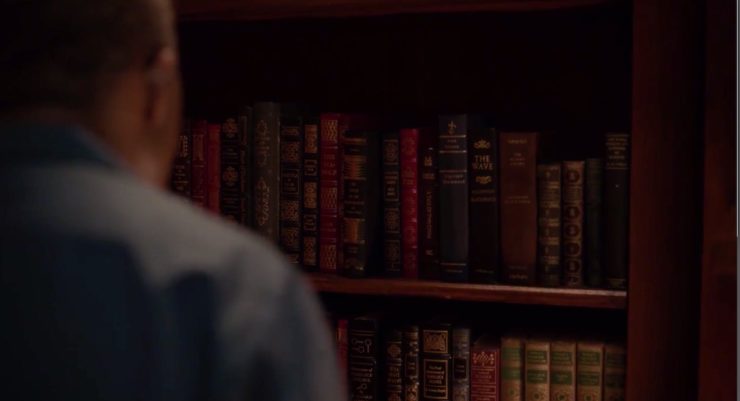
- John Silence by Algernon Blackwood (published 1908)
- The Human Chord by Algernon Blackwood (published 1910)
- The Scarlet Letter by Nathaniel Hawthorne (published 1850)
- The Count of Monte Cristo by Alexandre Dumas (serialized 1844-1846)
- A Tale of Two Cities by Charles Dickens (serialized 1859)
- The narration over the spell at the end is the 1970 spoken word poem “Whitey on the Moon” by Gil Scott-Heron.
- The discussion at the breakfast table also references a song, “I Shot the Sheriff” by Bob Marley.
- Last week I forgot to include two other Gordon Parks photos in my list of cultural references: the one with the Black mother and daughter standing under the “Colored Entrance” sign and the Black father with his children at the burger joint.
- Also forgot to mention Denmark Vesey, the man behind the name of the bar where Montrose wastes his time.
Final thoughts
- The sound I made when the theme song to The Jeffersons came on.
- Kudos to the costume designer for briefly putting Leti in a dress that looked almost exactly like the one her sister wore in the premiere.
- Anyone else weirded out by how much William looks like he could be a Braithwaite? I have a theory…
- Titus Braithwaite wore a pointed hood that bears a striking resemblance to the robe of a Klan Grand Wizard.
- “These white folks don’t be seasoning their food.” *chef’s kiss*
- There are a lot of men at the dinner, but only a few at the ceremony. That doesn’t bode well for Atticus down the line.
- I hope you noticed the names on the painting’s frame.
- Huh. So the shoggoths aren’t just created by biting their victims, but born from surrogate cow mothers.
- Hey! It’s Erica Tazel!
- After all that pain and screaming, no one actually got to eat any of Samuel Braithwaite’s organs.
- Anyone catch the name George mentioned between Blackwood and Smith? Or what some of the other books were on the bookshelf? I missed them; digital screeners don’t come with closed captioning, and the image quality isn’t clear enough to examine details.
Alex Brown is a teen services librarian by day, local historian by night, author and writer by passion, and an ace/aro Black woman all the time. Keep up with her on Twitter and Insta, or follow along with her reading adventures on her blog.










